Midterm 2014 Guide: Third-Party Senate Candidates Give Establishment Republicans Conniptions
Liberty-minded small government views may be the missing ingredient.
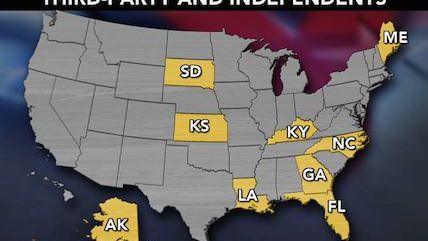
To take control of the Senate this November, Republicans need a net gain of six Senate seats to take control of Congress, but third party candidates in North Carolina, Kansas, South Dakota, Georgia, (and sort of Louisiana) may undermine this goal.
In North Carolina, a libertarian pizza deliveryman could determine the race between Kay Hagan and Thom Tillis. An independent in Kansas is leading the Republican incumbent Pat Roberts in many recent polls, also with a libertarian who could influence the outcome. An independent in South Dakota has introduced uncertainty in what should have been considered an "in the bag" seat for Republicans. A libertarian and tea partier could force both Louisiana and Georgia into a run-off election. Strikingly in Virginia, the Libertarian candidate is capturing more votes than the Republican among young voters.
While it is true third-party candidates typically don't win, serious third party challengers can still identify the major parties' vulnerabilities based on which types of voters they peel away.
For instance, as Sen. John Cornyn (R-TX) explained, "If people don't like their choices with the Republican candidate or the Democratic candidate, then you're going to see a spurt in third-party candidates, so they can definitely affect outcomes."
Examining third-party influence across the country reveal the pivotal voters tend to exhibit similar patterns: Independents who lean right although sometimes left, often with a libertarian streak, were disillusioned during the GOP primary by establishment candidates earlier this year, and now are less enthusiastic about supporting the major party candidate.
Here are some of the races we examined:
North Carolina Senate
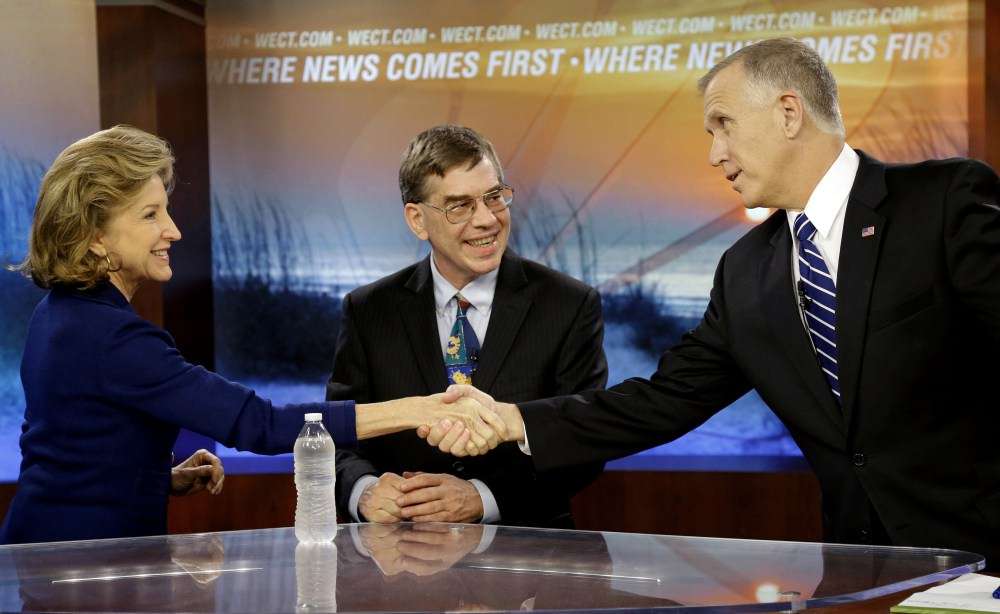
In North Carolina, incumbent Democrat Kay Hagan is in a bitter fight with Republican Thom Tillis, each pulling 44 percent of the vote. The tight race means that libertarian Sean Haugh garnering 5 percent of the vote among likely voters could impact which party wins the seat. Even if only a portion of his supporters show up, they could influence an election this close.
Recent shifts in public opinion combined with Hagan's support of the Affordable Care Act/Obamacare had made the North Carolina incumbent vulnerable. Consequently, some observers view libertarian Sean Haugh as part of the reason Republican Thom Tillis isn't leading in the polls. Demonstrating the lopsided enthusiasm, an NBC/Marist poll finds 7 in 10 Kay Hagan supporters "strongly" support her, while only 54 percent of Tillis' can say the same. While a plurality of likely voters (48 percent) say they'd rather vote for a Republican than a Democrat (43 percent) for Congress, this hasn't translated into stronger support for Tillis.
There are several reasons Thom Tillis is scrambling in the final days of the election. First, many grassroots tea party groups and Republicans in the area remain disillusioned since the GOP primary earlier this year when tea party favorite Greg Bannon lost to Tillis. Bannon had appealed to independent-minded libertarian voters in the area, but Tillis has thus far failed to gin up their enthusiasm.
Tea party groups also remain unimpressed with Tillis' candidacy viewing him as not sufficiently fiscally conservative and a "corporatist" who uses government to give special favors to interest groups. Insiders do tend to get this reputation.
Moreover, libertarian Sean Haugh had once registered as a Republican to vote for Ron Paul in 2008, which further bolsters his credentials among a small but very active group of Paul supporters.
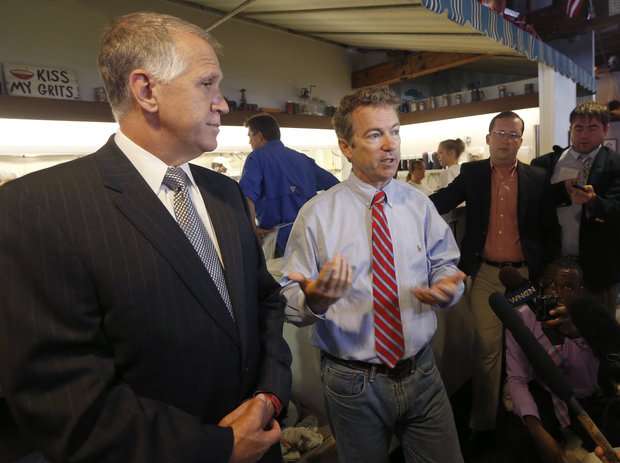
Although Sen. Rand Paul (R-KY) had previously endorsed Tillis' primary opponent, they have since teamed up on the campaign trail. The fact that Tillis sought out Paul's support provides further indication of what types of potential voters he's most concerned about losing: libertarian leaning, independent-minded voters.
Tea party groups are divided over whether to support Tillis for the hope of taking back the Senate—which they call "clothespin support"—or withholding their support for a RINO republican. By clothespin support, they mean holding their noses as they support a candidate whom they view as the better of two bad options.
Kansas Senate
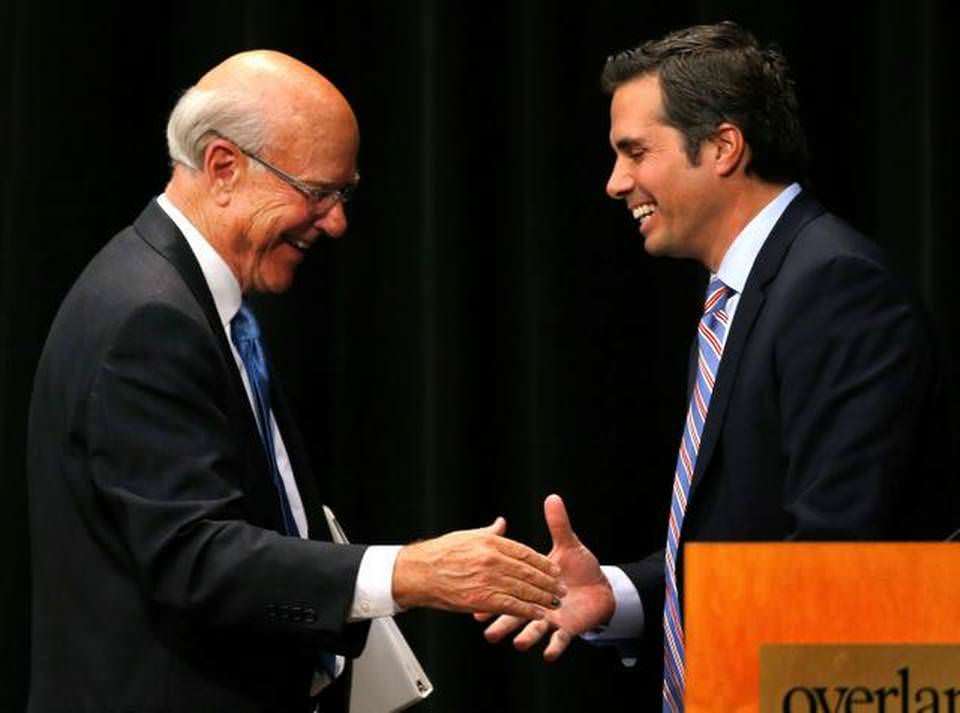
In Kansas the Republican, veteran incumbent Pat Roberts, has found himself in an unexpected and unusual position of potentially losing to an independent. After Democratic candidate Chad Taylor dropped out of the race, Roberts found himself once again in two-way race but trailing or barely tying with independent candidate Greg Orman. SurveyUSA, which has a successful history of polling Kansas voters, finds Orman at 44 percent and Roberts at 42 percent. Further complicating the race, libertarian candidate Randal Batson is garnering 4 percent of the vote. In a close race like this, the libertarian could again influence who wins.
Similar to North Carolina, grassroots tea party groups and Republicans remain bitter over the GOP primary earlier this year when Roberts defeated their favored candidate Milton Wolf in a closer than expected outcome, 48 to 41 percent. In contrast, Republican Governor Sam Brownback garnered 63 percent of the primary vote.
A significant number of likely Republican voters simply aren't excited about 3-term Senator Pat Roberts for several reasons. Like Tillis, they view Roberts as a so-called establishment Republican who gives special favors to interest groups and compromised principles by voting to raise the debt ceiling. The primary also ginned up anger over Roberts not actually having a residence in Kansas, but rather being a full-time creature of Washington DC.
Interestingly, Politico reported Milton Wolf, who purportedly ran to the "right" of Roberts, considered endorsing independent Greg Orman, to the "left" of Roberts. This shows the issues that matter in this race are more than just right and left. However, since Orman would not promise to caucus with Republicans, Wolf did not endorse Orman. Instead, in a surprising turn, Wolf took one for the Red team and endorsed Roberts.
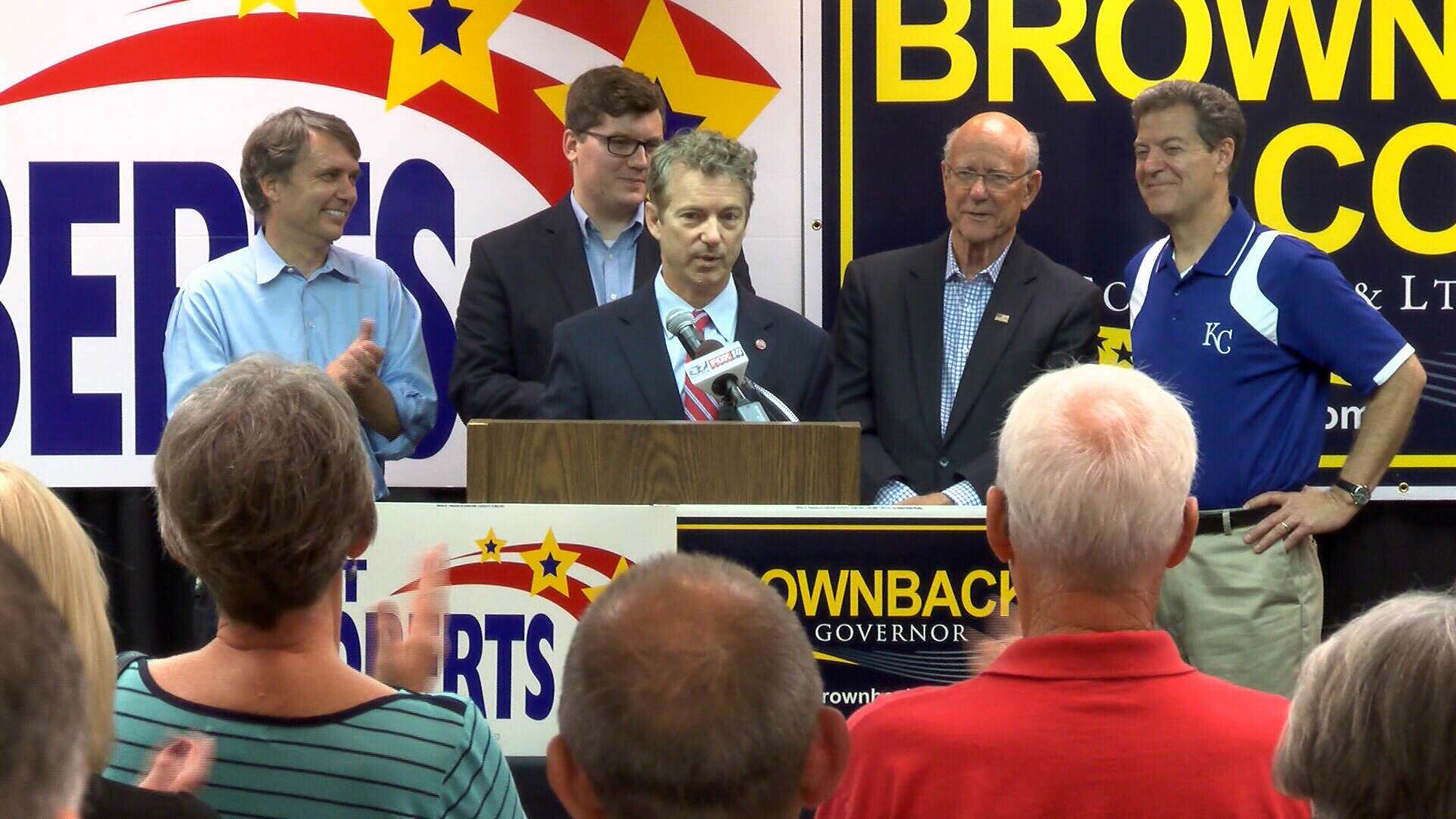
Shedding light on the types of voters Roberts is having trouble courting, Roberts has also enlisted the support of Sen. Rand Paul, and Sen. Ted Cruz (R-TX), another tea party backed candidate, as well as Sarah Palin. This further demonstrates Roberts' weakness among tea party conservatives.
While Greg Orman has been both a Republican and a Democrat, he refuses to promise which party he'd caucus with if elected. However, the fact that FEC records show he's sent 87 percent of his contributions to Democrats may explain why national tea party groups have formally shifted their support to Roberts. Both Tea Party Patriots Citizens Fund and Tea Party Express are actively campaigning for Roberts and trying to mobilize disillusioned voters.
Georgia Senate

In Georgia's open senate race, Republican David Purdue is essentially tied with Democrat Michelle Nunn. Real Clear Politics puts the averages at 45.8 for Perdue and 45.3 for Nunn. Consequently, libertarian candidate Amanda Swafford's 4 percent could prevent either major candidate from reaching Georgia's 50 percent threshold, forcing a run-off.
In July of this year, Election Lab forecasts gave Perdue a 98 percent chance of winning in July. Why isn't he doing better? The story is similar to Kansas and North Carolina, after a bruising GOP primary, David Perdue has struggled to regain support from grassroots conservatives he turned off during the primary.
Georgia's primary race was much messier than other states. In the initial five-way primary race, Grassroots tea Party support was split between former Georgia Sec of State Karen Handel (who received Sarah Palin's endorsement), Rep. Paul Broun (R-GA), and Rep. Phil Gingry (R-GA). Business conservatives alternatively preferred political outsider and former CEO David Purdue, and Rep. Jack Kingston (R-GA). When only Purdue and Kingston proceeded to the run-off, grassroots conservatives threw their support toward Kingston. In fact, Kingston has been shifting more conservative in his voting record since the tea party emerged and emphasized his own personal thrift. However, grassroots conservatives lost again as Perdue defeated Kingston in the run-off.
One may have thought Perdue being a political outsider could have bridged the gap between the different Republican factions. However, he got into trouble with the grassroots when he supported both spending cuts and revenue increases, which tea partiers took to mean tax hikes. Perdue has since clarified he meant growing the economy rather than tax increases.
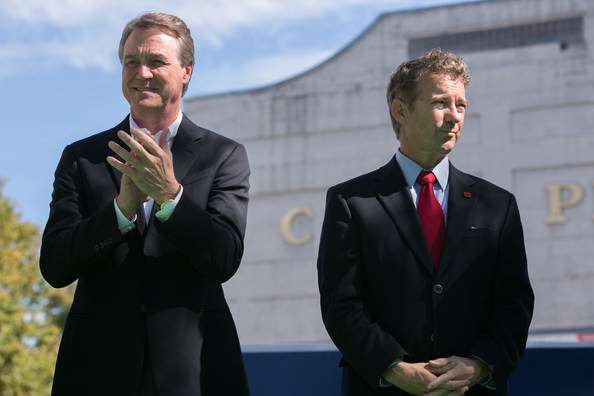
Once again, the establishment-favored candidate, Perdue, has sought the help of Sen. Rand Paul in efforts to build credibility with libertarian-leaning and tea party type voters while also holding onto his moderate base of support. Similar to Kansas, national tea party groups like Tea Party Patriots Citizens Fund have since endorsed Perdue fearing Democratic control of the Senate.
Louisiana Senate
Louisiana uses a "jungle primary" to select their Senator requiring the winner to exceed a 50 percent threshold, like Georgia. However, the latest USA Today/Suffolk poll found Democrat Mary Landrieu with 36 percent, Republican Bill Cassidy with 35 and tea party-backed Rob Maness with 11 percent. While not a third party candidate, the presence of Maness prevents Cassidy from any hope of reaching a 50 percent threshold, almost guaranteeing a run-off with the top two candidates in December.
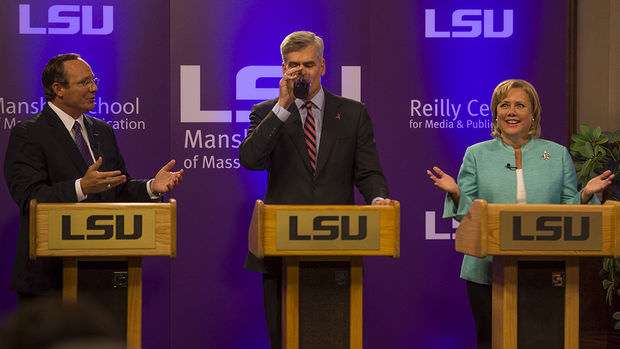
Cassidy cannot point to a bitter GOP primary fight to explain muted grassroots enthusiasm for his candidacy. Even though he joined the Congressional Tea party Caucus he has had trouble gaining traction among grassroots conservatives, and tea party express (a national affiliate) and Sarah Palin endorsed Maness. Part of his difficulties stem from the fact that grassroots don't view him as authentically fiscally conservative—for instance he vocally supported TARP and then changed his position 2010. On top of that Cassidy previously donated to Mary Landrieu in 2002 and criticized Republican Gov. Bobby Jindal. Maness is also carving out space further right on immigration.
South Dakota Senate

In South Dakota, both independent leaning Democratic and Republican voters are upsetting what was expected to be a smooth election. The latest Rasmussen survey finds Rounds with 45 percent, his Democratic opponent Rick Weiland with 31 percent, and independent Larry Pressler with 21 percent.
When Democratic incumbent Tim Johnson retired this year, both Republicans and Democrats were hopeful to fill the seat. However, without strong Democratic candidates taking the initiative to run, observers expected former Gov. Mike Rounds to take the seat. However, Rounds became embroiled in an immigrant investment scandal that could potentially result in his indictment.
Now enters independent candidate Larry Pressler. This third-party candidate actually once held this very seat, but as a Republican. However, he refuses to sign a pledge not to raise additional taxes, supports the Affordable Care Act, and supported Barack Obama in 2008. Nevertheless, his reasoning might resonate with libertarians as well:
"Part of my reason for supporting Obama—it was for conservative reasons…It's been Republican presidents and Republican congresses who've added more to the deficit, and Democrats who've added less to the deficit."
As evidenced by the aforementioned quote, Pressler is also a fiscal hawk with an eye to reforming entitlements and raising the retirement age.
With this mixed bag approach to politics, it's little surprise he could pick off both independent-minded Democratic and Republican voters. In fact, Rick Weiland complained that outside groups attacking his Republican opponent were actually helping the independent Pressler over Weiland the Democrat.
Republican Mike Rounds has also created further problems for himself by failing to energize conservative grassroots support. Many likely Republican voters are turned off by the fact that he supported TARP, the stimulus, the Medicare Part D expansion, and proposing paying down the state deficit with reserves rather than actually cutting spending. Local tea party groups who would otherwise endorse candidates have refused to lend Rounds their support. President of the South Dakota Citizens for Liberty group explained at a local event, "[Mike Rounds] likes to build government and likes to spend money."
Implications
Across these key races, third party candidates undermine the traditional support enjoyed by the two major party candidates. They point out weakness and vulnerabilities, and tend to reveal a similar pattern. Independents, both left and right leaning, but particularly right leaning, libertarians, and tea partiers are at the highest risk of "defection" from casting a traditional partisan ballot.
The fact that the most vulnerable Republican candidates have enlisted the help of Sen. Rand Paul demonstrates the types of voters they are having the greatest difficulty connecting with—the liberty-minded, small government libertarians and conservatives.
So-called "Establishment Republicans" have had difficulty convincing their potential voters they are sufficiently fiscally conservative and principled such that they won't dole out special favors to Wall Street, K Street, or even Main Street once they are elected. It may be that Rand Paul's unique brand of liberty-minded small government conservatism is one of the missing ingredients.


Show Comments (154)